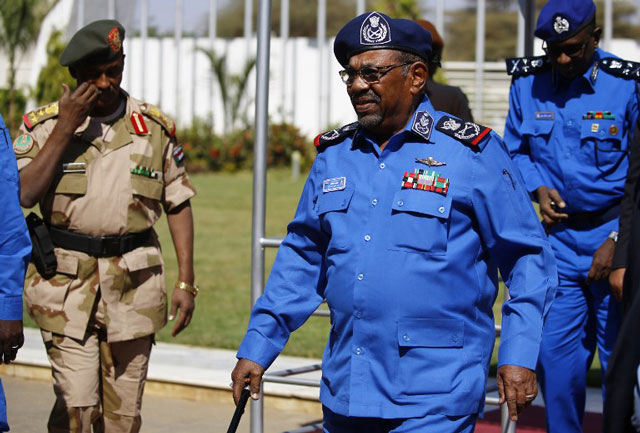
The reign of Omar al-Bashir is over. His 30 years of rule are finally at an end. Like previous Sudanese leaders, he was finally toppled by the army, which finally sided with the people over the president.
| MARTIN PLAUT | But it was the presence of vast numbers of ordinary citizens on the streets of Khartoum and other cities and towns across the country that precipitated the change of government. Women played a critical role in his downfall, as did a range of professional organisations which refused to accept the president’s rule any longer.
There is a long history of coups in Sudan. The first, in 1969, saw Colonel Gaafar Nimeiry in power. In an early analysis of African coups, anti-apartheid activist and author Ruth First, who was killed by the apartheid regime, wrote in her book, Barrel of a gun: “The young officer coup of 1969 wrenched power not from a feudal-based aristocracy but from traditional political parties enmeshed in sectarian religious politics”.
After several failed coups, Nimeiry was finally overthrown by the head of the army, Field Marshal Suwar al-Dahab. The subsequent election ushered in the government of Prime Minister Sadiq al-Mahdi. In turn, he was toppled by Omar al-Bashir in June 1989.
Al-Bashir, in a sometimes troubled alliance with Islamists of the National Islamic Front, has held power ever since. He leaves a country that is far from at peace with itself. Almost half of the population lives below the poverty line. For a long time the president’s recipe of repression and government handouts worked. But the people of Sudan reached a point where they’d had enough. Human rights groups estimated that around 40 people had died in the protest since last December, yet still they continued.
Early life and rise to power
Al-Bashir, born in 1944 to a peasant family from Northern Sudan who moved to the capital, rose to prominence when he joined the army. He went to study in an Egyptian military college and fought with the Egyptian army in the 1973 war against Israel.
Returning to Sudan, he was rapidly promoted and took a leading role in the military campaign to try and crush southern rebels of the Sudan People’s Liberation Army. In February 1989 a group of army officers presented Prime Minister al-Mahdi with an ultimatum demanding that he either find a political settlement to the civil war or give the military the means to seek a battlefield victory.
Frustrated by the prime minister’s refusal to do either, al-Bashir overthrew the government. At the time he was described in the West as a “little-known officer identified as Brig. Omar Hassam Ahmed al-Bashir” who announced over Omdurman radio that a new Revolutionary Council had taken control.
There was no return to civilian rule. Despite being a military autocrat, al-Bashir had a shrewd sense of politics. Not only did he survive the complex political intrigues of Khartoum, he saw off a number of severe challenges. The first was the southern rebellion. The mainly African south had resented the domination of the predominantly Arab north since the independence of Sudan in 1956 from the joint British and Egyptian government that administrated the country.
The bitter struggle finally led to the independence of South Sudan in July 2011. Khartoum’s long war to resist this had been unsuccessful, yet al-Bashir managed to survive this defeat: he even attended the independence celebrations on 9 July 2011.
There was a second revolt from the eastern region of Darfur, which had long enjoyed considerable autonomy from the centre. The conflict erupted in 2003, when rebel movements attacked government targets, accusing the Sudanese government of oppressing Africans in favour of Arabs.
The fighting was to displace some 2.7 million people and led to the deaths of some 300,000.
At one time Darfur won international attention. Al-Bashir has faced charges of war crimes and genocide from the International Criminal Court since 2009, allegations which still hang over his head.
But the concerns of international celebrities like George Clooney gradually faded, leaving bitterness in their wake.
The President also offered sanctuary to Osama bin Laden, the leader of al-Qaeda, who made his home in Khartoum from the 1990’s. But intense diplomatic pressure from Washington led to bin Laden being forced out of Sudan and relocating to Afghanistan. In return the U.S. provided support for the Sudanese government – backing that was strengthened under President Barack Obama.
It was this ability to play a skillful combination of internal and external balancing acts, plus ruthless repression and a divided opposition, which kept al-Bashir in power for three decades.
The denouement
Finally it was something as simple and essential as bread that led to his downfall. Protests in the northern city of Atbara in December 2018 lit the fuse that finally brought tens of thousands onto the streets.
What started as a fight against the tripling of bread prices led to a challenge to the entire regime and the downfall of the dictatorship. President Omar al-Bashir is the second of Africa’s longest serving leaders to be forced from power by a popular uprising. Earlier this month Abdelaziz Bouteflika was forced out of office.
But removing dictators is easier than ushering in democracy. The Egyptian case is all too familiar across the Middle East. Mass demonstrations on 30 June 2013 brought tens of millions of Egyptians took to the streets to denounce Mohamed Morsi. They got General Abdel Fattah El-Sisi in his place. He now intends to hold power until 2034.
****
Martin Plaut, Senior Research Fellow, Horn of Africa and Southern Africa, Institute of Commonwealth Studies, School of Advanced Study
Source: The Conversation
 The Independent Uganda: You get the Truth we Pay the Price
The Independent Uganda: You get the Truth we Pay the Price


